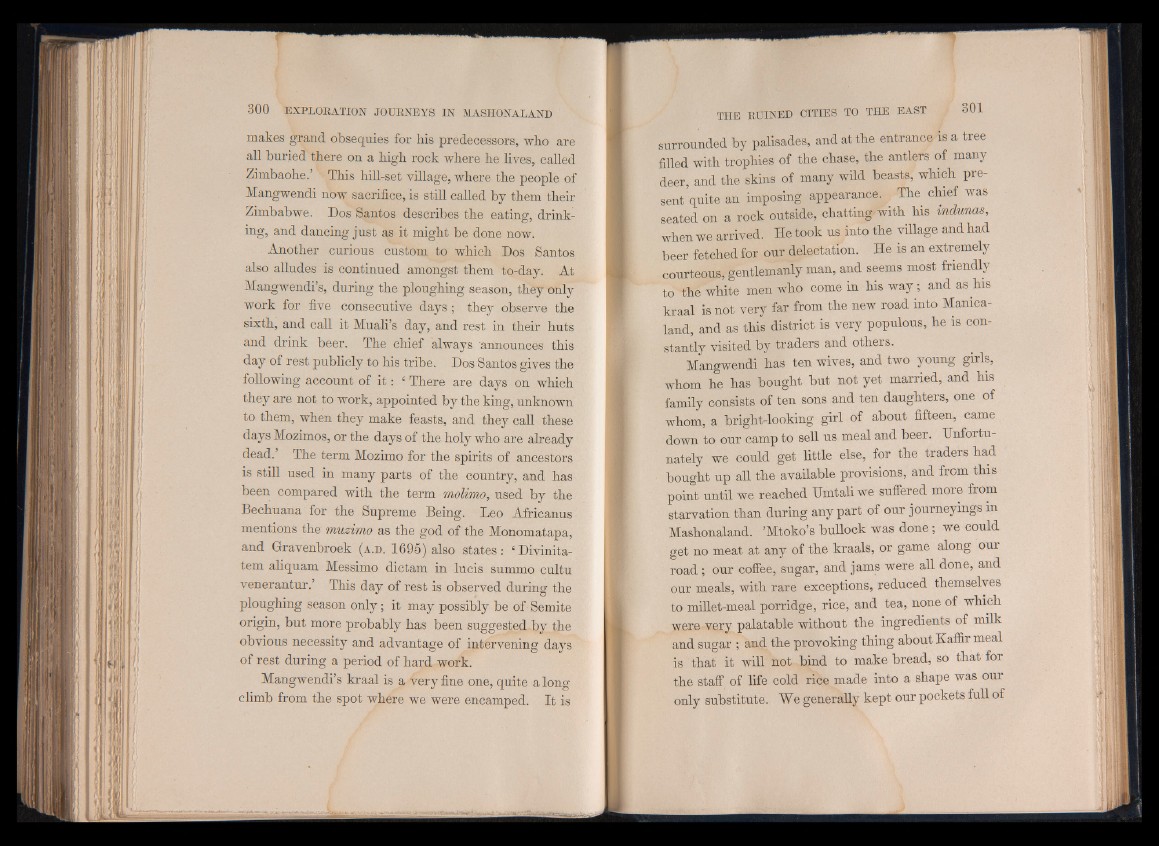
makes grand obsequies for his predecessors, who are
all buried there on a high rock where he lives, called
Zimbaohe.’ This hill-set village, where the people of
Mangwendi now sacrifice, is still called by them their
Zimbabwe. Dos Santos describes the eating, drinking,
and dancing just as it might be done now.
Another curious custom to which Dos Santos
also alludes is continued amongst them to-day. At
Mangwendi’s, during the ploughing season, they only
work for five consecutive days; they observe the
sixth, and call it Muali’s day, and rest in their huts
and drink beer. The chief always announces this
day of rest publicly to his tribe. Dos Santos gives the
following account of i t : c There are days on which
they are not to work, appointed by the king, unknown
to them, when they make feasts, and they call these
days Mozimos, or the days of the holy who are already
dead.’ The term Mozimo for the spirits of ancestors
is still used in many parts of the country, and has
been compared with the term molimo, used by the
Bechuana for the Supreme Being. Leo Africanus
mentions the muzimo as the god of the Monomatapa,
and Gravenbroek (a.d . 1695) also states: 4Divinita-
tem aliquam Messimo dictam in lucis summo cultu
venerantur.’ This day of rest is observed during the
ploughing season only; it may possibly be of Semite
origin, but more probably has been suggested by the
obvious necessity and advantage of intervening days
of rest during a period of hard work.
Mangwendi’s kraal is a very fine one, quite a long
climb from the spot where we were encamped. It is
surrounded by palisades, and at the entrance is a tree
filled with trophies of the chase, the antlers of many
deer, and the skins of many wild beasts, which present
quite an imposing appearance. The chief was
seated on a rock outside, chatting with his mdunas,
when we arrived. He took us into the village and had
beer fetched for our delectation. He is an extremely
courteous, gentlemanly man, and seems most friendly
to the white men who come in his way; and as his
kraal is not very far from the new road into Manica-
land, and as this district is very populous, he is constantly
visited by traders and others.
Mangwendi has ten wives, and two young girls,
whom he has bought but not yet married, and his
family consists of ten sons and ten daughters, one of
whom, a bright-looking girl of about fifteen, came
down to our camp to sell us meal and beer. Unfortunately
we could get little else, for the traders had
bought up all the available provisions, and from this
point until we reached Hmtali we suffered more from
starvation than during any part of our journeyings in
Mashonaland. ’Mtoko’s bullock was done; we could
get no meat at any of the kraals, or game along our
road ; our coffee, sugar, and jams were all done, and
our meals, with rare exceptions, reduced themselves
to millet-meal porridge, rice, and tea, none of which
were very palatable without the ingredients of milk
and sugar ; and the provoking thing about Kaffir meal
is that it will not bind to make bread, so that for
the staff of life cold rice made into a shape was our
only substitute. We generally kept our pockets full of